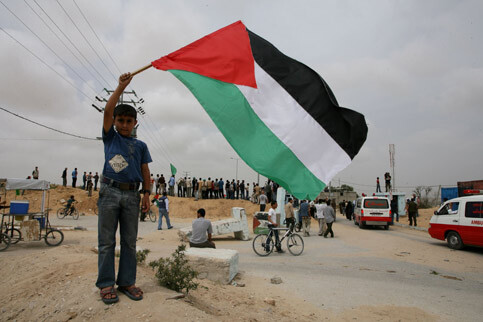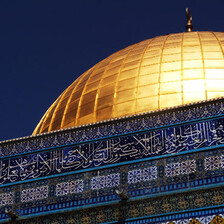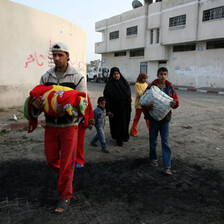Gaza Strip 19 June 2008

Palestinian attend a rally marking the 60th anniversary of the Nakba near Erez crossing in the northern Gaza Strip, May 2008. (Wissam Nassar/MaanImages)
In 2000 the UN General Assembly declared 20 June “World Refugee Day,” a day during which the world can focus on the experience and plight of refugees. It is a day that not only recognizes Palestinian refugees but also other unfortunate people whose lives have been disrupted by war and injustice.
I am a Palestinian refugee; my parents as well as my grandparents are refugees too, who fled from our village al-Majdal and settled in one of the eight refugee camps in the Gaza Strip. My grandparents passed away 15 years ago, without any chance for them to see their homeland again. My parents are old and sick now, and probably will face the same destiny as their parents and die without any chance of having a look to what was once their homeland. Looking at the hard lives of my grandparents and my parents brings me nothing but a bleak vision of my future and the future of my children as refugees for life.
Sixty years have passed since the Nakba — our forced displacement — and we, the Palestinians, are still called refugees. Knowing this fact — and recognizing the lack of privileges and denial of rights that a refugee must endure — being identified as a refugee in general, and as a Palestinian refugee in particular, means that there is no open horizons, no path for the future. There are only limited images that flow around one’s head. From the lives of one’s ancestors, where they lived and died in the same refugee camp, under the same circumstances, and how they face the same sufferings and injustice by Israel and the indifference of the world at large.
Expecting to have the same life as one’s parents or grandparents is very disappointing. Not only because their lives were hard, but because the parameters of one’s life become predictable: limited to the camp, to the same schools, the same universities, the same streets, and to the same Israeli obstacles, and reactions to any action taken by your people in self-defense of their dignity and their right to live normally.
In these circumstances, in which one can predict how one’s life will be and what one’s next step is before one take it, it is not worth it to plan, to dream, or even to feel happy when one achieves a spectacular success in school, work, or anything. The end result will always be the same: a life trapped in the same refugee camp where there is not much of a difference between day and night. It is very difficult to experience such feelings, that one’s life will be wasted for nothing. That one’s efforts will not make a change in one’s life and in the lives of others, and one’s dreams will be an attempt to escape form the reality that one has.
From one generation to the next, nothing has changed. Being educated, or having a career is nothing if one is still only a refugee living in the same borders of a refugee camp, stranded as a refugee forever. Therefore, a refugee should be added to the list of different citizenships of the world, and the word “refugee” should be used in our passports as a definition of the stateless, restless, and endless journey we must live.
Najwa Sheikh is a Palestinian refugee from al-Majdal located just north of the Gaza Strip. Shiekh has lived in refugee camps in Gaza her entire life. She is married with three children.





